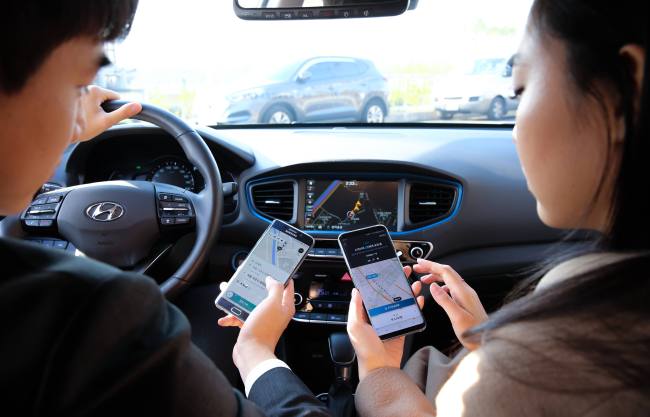뉴스속보 상세보기
Hyundai Motor is expanding its car-sharing venture to tap into the promising industry, by announcing a collaboration with a local ride sharing startup Luxi on Tuesday.
Hyundai Motor has invested some 5 billion won ($4.6 million) in Luxi this August and plans to work together on developing carpooling algorithm and platform in search for new business opportunities. The project is undertaken by the firm’s future research and development project called Project Ioniq.
Two years into business, Luxi has 200,000 registered cars and 780,000 members. It has made some 4 million trips.
Hyundai joins moves by other global automakers such as BMW, Mercedes-Benz, GM and Volkswagen that have already started car sharing services, eyeing for a stake of the growing industry.
According to global consulting firm McKinsey, the number of new vehicles purchased worldwide will decrease 4 million units every year, while vehicles used for carpooling is expected to rise by 2 million units in 2030.
Korea’s ridesharing market will grow to be worth some 500 billion won in 2020 from 600 million won in 2011, according to Samjong KPMG Economic Research Institute.
Carmakers also deem they can benefit from running the service by receiving immediate feedback from customers about new cars or technologies.
With Luxi, Hyundai Motor has launched a pilot carpooling program for 100 customers who lease an Ioniq hybrid, the company said.
The platform is designed to match users based on Blue Link installed in Ioniq, which analyzes the driver’s commute pattern.
Hyundai Motor set foot in the ride sharing business in April 2016 with local car sharing service company Green Car. It had offered Ioniq hybrid EVs to customers for test drives free of charge.
Hyundai has also supplied 100 units of Ioniq EV to a car sharing service in Amsterdam, The Netherlands in October this year.
The local carmaker said it will speed up development in future technology such as driverless taxi RobotCab and self-driving delivery vehicles.
By Kim Bo-gyung (lisakim425@heraldcorp.com)
Hyundai Motor has invested some 5 billion won ($4.6 million) in Luxi this August and plans to work together on developing carpooling algorithm and platform in search for new business opportunities. The project is undertaken by the firm’s future research and development project called Project Ioniq.
Two years into business, Luxi has 200,000 registered cars and 780,000 members. It has made some 4 million trips.
Hyundai joins moves by other global automakers such as BMW, Mercedes-Benz, GM and Volkswagen that have already started car sharing services, eyeing for a stake of the growing industry.
According to global consulting firm McKinsey, the number of new vehicles purchased worldwide will decrease 4 million units every year, while vehicles used for carpooling is expected to rise by 2 million units in 2030.
Korea’s ridesharing market will grow to be worth some 500 billion won in 2020 from 600 million won in 2011, according to Samjong KPMG Economic Research Institute.
 |
| Hyundai Motor and Luxi launched a pilot carpooling program for commuters in Seoul and Gyeonggi Province. (Hyundai Motor) |
Carmakers also deem they can benefit from running the service by receiving immediate feedback from customers about new cars or technologies.
With Luxi, Hyundai Motor has launched a pilot carpooling program for 100 customers who lease an Ioniq hybrid, the company said.
The platform is designed to match users based on Blue Link installed in Ioniq, which analyzes the driver’s commute pattern.
Hyundai Motor set foot in the ride sharing business in April 2016 with local car sharing service company Green Car. It had offered Ioniq hybrid EVs to customers for test drives free of charge.
Hyundai has also supplied 100 units of Ioniq EV to a car sharing service in Amsterdam, The Netherlands in October this year.
The local carmaker said it will speed up development in future technology such as driverless taxi RobotCab and self-driving delivery vehicles.
By Kim Bo-gyung (lisakim425@heraldcorp.com)


